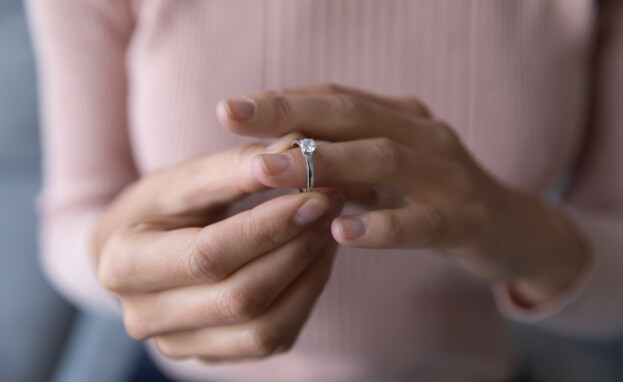An engagement ring can be a powerful symbol of love and affection—but that sparkly rock can also empty out your bank account in a hurry. So, if your generous gift doesn’t precede a trip down the aisle or a lifelong marriage, what happens with that costly ring can be a big point of contention.
Who keeps the ring depends on a variety of factors, but the two most important are: what state you live in and did you actually get married.
Who keeps the engagement ring if the couple never gets married?
You took Beyoncé’s advice and “put a ring on it.” Unfortunately, sometimes all that glitters is not gold, and now you find yourself a single person before the wedding day.
Broken engagements are common, and working out the emotional and logistical issues are difficult.
Who keeps the ring in the event of a broken engagement depends on who bought the ring, how they gifted the ring, and the State law where you are living.
In traditional engagements, where one partner purchases the ring and gives it to the other while proposing marriage, many states view the engagement ring as a conditional gift – meaning a gift with strings attached. Conditional gifts must be returned to the donor (or proposer) if the certain, specified condition is not fulfilled. With an engagement ring, the condition is marriage. In other states, the law is less clear about whether an engagement ring is a conditional gift, and therefore, who gets to keep it after things go sour.
Maryland recognizes the right of a donor to recover a conditional gift. However, in Maryland, whether an engagement ring is a conditional gift depends on if the ring was given with the clear and intentional condition of marriage. To determine clear intent, a court looks for either an express declaration of the condition of marriage or an implied intent of the condition of marriage based on the circumstances of the proposal. In Maryland, a court found that a diamond ring gifted in contemplation of marriage, while the couple was living in a familial relationship, was a conditional gift and required that it be returned to the proposer after the couple did not marry.
In DC, there is no law that says exactly what happens with an engagement ring if the parties do not marry. Nevertheless, DC recognizes the concept of conditional gifts. This leaves the door open to the possibility that a DC court could find that in a traditional engagement, if the contemplated marriage is called off before the wedding day, the engagement ring could be a conditional gift that must be returned to the proposer.
Who keeps the engagement ring in the event of a divorce?
What happens with an engagement ring upon divorce also depends on the circumstances surrounding the ring and the State law where you are living. In most states, where there has been a traditional engagement, in the event of divorce, the engagement ring belongs to the recipient – the proposer does not get it back.
Often there is one of two reasons behind this. First, many states view an engagement ring in a traditional engagement as a conditional gift, where the condition is fulfilled on the wedding date. Therefore, upon a couple’s marriage, the receiver of the ring keeps the ring, regardless of how the marriage ends. Second, many states recognize that a person divorcing keeps property that the individual had prior to marriage. Since in a traditional engagement, engagement rings are given before marriage, the recipient keeps the engagement ring after divorce.
In Maryland, in the event of divorce, an engagement ring given in a traditional engagement belongs to the recipient. While DC does not have a specific law on point, DC law provides that an individual keeps their pre-marital property in the event of divorce. A word of warning—engagement rings not given in a traditional engagement, such as those that are a family heirloom, purchased by both parties, given during the marriage, or are upgraded during a marriage may be treated differently.
Negheen T. Guiv contributed to this article.
For more information, contact Erin at 301-347-1261 or by email at [email protected].


